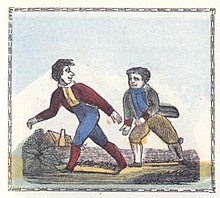Foot racing

An 1836 illustration of a "Walking Wager", from Peter Piper's Practical Principles of Plain and Perfect Pronunciation, by Anonymous, Philadelphia.
|
|
| Presence | |
|---|---|
| Country or region | British Isles |
| Olympic | No |
| Paralympic | No |
| Obsolete | Yes |
Pedestrianism was a 19th-century form of competitive walking, often professional and funded by wagering, from which the modern sport of racewalking developed.
During the late eighteenth and nineteenth centuries, pedestrianism, like running or horse racing (equestrianism) was a popular spectator sport in the British Isles. Pedestrianism became a fixture at fairs – much like horse racing – developing from wagers on footraces, rambling, and 17th century footman wagering. Sources from the late 17th and early 18th century in England describe aristocrats pitting their carriage footmen, constrained to walk by the speed of their masters' carriages, against one another.
The first notable exponent of this long distance walking is generally considered to be Foster Powell (1734–93) who in 1773 walked 400 miles from London to York and back, and in 1788 walked 100 miles in 21 hours 35 minutes. By the end of the 18th century, and especially with the growth of the popular press, feats of foot travel over great distances (similar to a modern Ultramarathon) gained attention, and were labelled "pedestrianism".
One of the most famous pedestrians of the day was Captain Robert Barclay Allardice, called "The Celebrated Pedestrian", of Stonehaven. His most impressive feat was to walk 1 mile every hour for 1000 hours, which he achieved between June 1 and July 12 1809. The feat captured the public's imagination and around 10,000 people came to watch over the course of the event. During the 19th century, attempts to repeat the athletic challenge were made by many pedestrians, including Ada Anderson, who developed it further and walked a quarter-mile in each quarter-hour over the 1,000 hours. Another popular goal was for competitors in long distance events to walk 100 miles in less than 24 hours, from which they earned the nickname "centurions". Enormous cash prizes were offered for the races and they were a popular activity for the press, crowds of working class spectators, and the betting public until the 1880s.
...
Wikipedia
